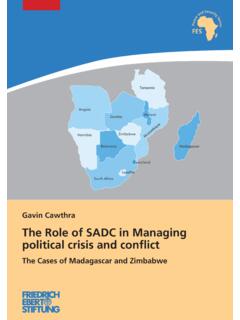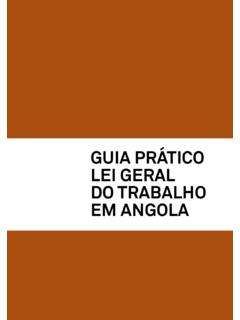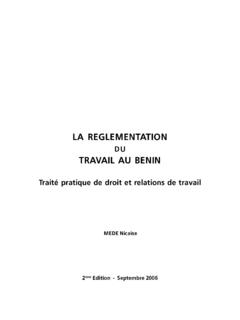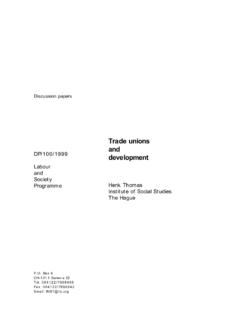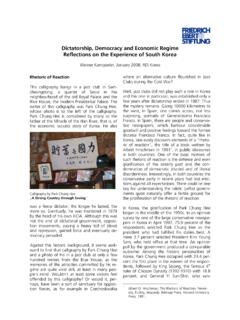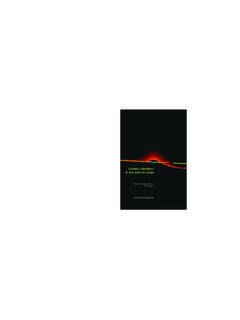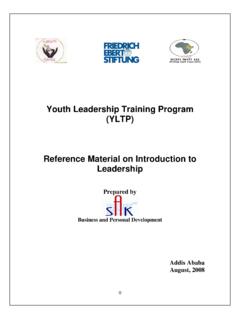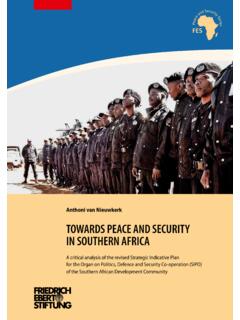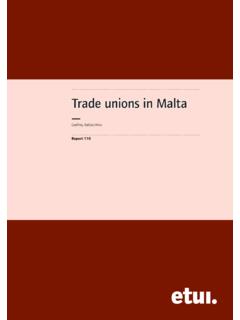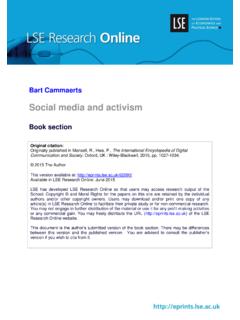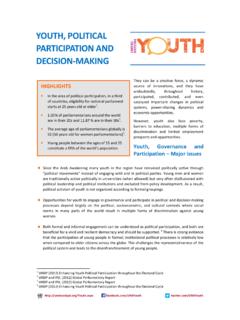Transcription of New media vs. old politics : the internet, social media ...
1 Series New media vs. Old politics The internet , social media , and democratisation in pakistan By Marcus Michaelsen 2011. 2011 Friedrich-Ebert-Stiftung (FES). Published by fesmedia Asia Friedrich-Ebert-Stiftung Hiroshimastrasse 28. 10874 Berlin, Germany Tel: +49-30-26935-7403. Email: All rights reserved. The ndings, interpretations and conclusions expressed in this volume do not necessarily re ect the views of the Friedrich-Ebert- Stiftung or fesmedia Asia. fesmedia Asia does not guarantee the accuracy of the data included in this work. ISBN: 978-969-9675-00-3 New media vs. Old politics The internet , social media , and democratisation in pakistan fesmedia Asia fesmedia Asia is the media project of the Friedrich-Ebert-Stiftung (FES) in Asia. We are working towards a political, legal and regulatory framework for the media which follows international Human Rights law and other international or regional standards as regards to Freedom of Expression and media Freedom. FES in Asia The Friedrich-Ebert-Stiftung has been working in Asia for more than 40 years.
2 With of ces in 13 Asian countries, By Marcus Michaelsen FES is supporting the process of self-determination democratisation and social development in cooperation 2011. with local partners in politics and society. Friedrich-Ebert-Stiftung The Friedrich-Ebert-Stiftung is a non-governmental and non-pro t making Political Foundation based in almost 90 countries throughout the world. Established in 1925, it carries the name of Germany's rst democratically elected president, Friedrich Ebert, and, continuing his legacy, promotes freedom, solidarity and social democracy. Content 3. The internet in pakistan .. 37. Expecting internet Expansion .. 37. Governmental Policies: Legislation (and Censorship). Taking 39. List of Acronyms .. 5. About the Author .. 6 4. Political internet Use in pakistan .. 43. Acknowledgements .. 7 social media and politics : Digital Precursors .. 43. Abstract .. 8 Extremism and Militancy on the Net .. 45. Online media and Civil Society Mobilisation: I. THE internet , social media , AND POLITICAL CHANGE: The Emergency Period and the Lawyers' Movement.
3 49. AN ONGOING DEBATE .. 10 social Networks and Citizen Engagement: The 2010 53. 1. Political Transformation: A Theoretical Approach .. 11 Citizen Journalism and Traditional media : 2. media in Political Transitions: Limits and Potentials .. 12 Mutual In uence, Completion, and Convergence .. 54. 3. The internet as a Potential Tool for democratisation .. 14 Debating On and Over the internet : Facebook, Blasphemy, and the Con ict over pakistan 's Identity .. 58. Factors Restraining the Impact of the internet .. 15. Transnational Networking for Local Activism: Potential E ects of the internet .. 16. The Take Back the Tech! Campaign .. 61. 4. Conclusion and Research Guidelines .. 21. Digital media for Awareness and Advocacy: .. 63. 2. pakistan AS A CASE STUDY .. 24. 5. Conclusion .. 64. 1. pakistan 's Political Transformation .. 24. Websites and blogs .. 68. A State of Crisis? .. 24. Bibliography .. 69. Blocking Change: The Political Elite .. 26. An Unfavourable International Setting.
4 28. Where Are Civil Society and Political Culture Heading? .. 29. 2. The media in pakistan .. 31. A Growing media Market .. 32. media Legislation: Freedom by Default? .. 34. Challenges and Shortcomings .. 34. Outlook: media Finding their 36. List of Acronyms About the author APC Association for Progressive Communications Marcus Michaelsen is nalising a PhD-thesis on the internet in Iran's political BBC British Broadcasting Company transformation at the department of media and communication studies, CNN Cable News Network University of Erfurt (Germany). He holds a MA in Middle Eastern Studies from the DW Deutsche Welle Universit de Provence (France) and was a research fellow at the Institut fran ais GNI Gross National Income de Recherche en Iran in Tehran from 2004 to 2006. His research interests include HuT Hizb ul Tahrir media in development and democratisation . ICT Information and Communication Technology IDI ICT Development Index ISP internet Service Provider ITU International Telecommunication Union LUMS Lahore University of Management Sciences MENA Middle East and North Africa PEMRA pakistan Electronic media Regulatory Authority PIE pakistan internet Exchange PTA pakistan Telecommunication Authority PTI pakistan Tehreek-e Insaf PIPS Pak Institute for Peace Studies PPP pakistan Peoples Party PTV pakistan Television Corporation TBTT Take Back the Tech!
5 TTP Tehreek-e Taliban VoA Voice of America WAR War Against Rape 5 6. Acknowledgements Abstract I would like to thank FES-representative Anja Minnaert and the entire sta of the In order to use pakistan as a case study in current debates on the political FES-o ce in Islamabad for giving me the opportunity and a convenient potential of new information and communication technologies, this environment to prepare this report. I must also thank those people in Karachi and report develops an analytical framework based on political transformation Islamabad who have kindly shared their knowledge either directly or by email: theory and research on media in processes of political change. Democratic Jehan Ara (P@SHA), Farieha Aziz (Newsline), Naveen Naqvi ( ), development in pakistan seems to be challenged by the resistance of the Jahanzaib Haque and Faria Syed (The Express Tribune), Shahzad Ahmad (Bytes for political elite to changes in the distribution of power and wealth; de cits All), Ammar Yasir (TeaBreak), Adnan Rahmat (Intermedia), Sana Saleem, Awab in economic and human development; a signi cant risk of social con ict.
6 Alvi, Beena Sarwar, Asif Mian, and Qurratulain Zaman. and the international community's perception of the country as a failing state in need of control and stabilisation. Most importantly, pakistan has to develop a political culture of rational debate, tolerance, and non-violent con ict resolution. pakistan needs an open debate on the country's future and identity in order to reach an authentic discourse on democracy and human rights. Extremist ideas gaining ground in the public sphere have to be countered by transparent information and inclusive opinion formation on the causes for the country's various problems as well as possible solutions. The media play an essential role in this process. Despite signi cant progress, pakistan 's media need to continue a path along of professionalisation and internal reform resisting current tendencies of sensationalism and political bias. Alternative media such as blogs, websites and social media may support this process by giving room to underreported topics and critical discussions.
7 The political use of the internet in pakistan is still in an early phase. There are about 20 million internet users, approx. 11 per cent of the population relatively low in comparison to Egypt (21 per cent), Tunisia (34 per cent), and Iran (43 per cent). internet proliferation is mainly hindered by de cits in education and infrastructure. Yet with a large young population, a comparatively high mobile phone penetration, and an as yet unexploited market of Urdu online media , pakistan has a signi cant potential for user growth. For some progressive layers of civil society the internet has already opened up a space for debate and civic engagement. 7 8. I. THE internet , social media AND POLITICAL CHANGE: AN ONGOING DEBATE. The political uprisings in Tunisia and Egypt in 2011 have further intensi ed discussions on the political potential of internet communication which, since the very beginning, have been closely tied to the worldwide expansion of the medium: the new information and communication technologies (ICT) are generally seen as facilitating a more open information exchange, the formation of alternative political opinions, and the mobilisation of social actors previously excluded from political participation.
8 Six months after Twitter messages about the protests of Iranian voters against the manipulation of the presidential elections in June 2009 had mobilised worldwide attention, US Secretary of State Hillary Clinton declared internet freedom a new priority in American foreign policy. Drawing on Cold War rhetoric, Clinton warned of a descending new information curtain and likened the battle against internet censorship to an overall ght against authoritarianism (Clinton 2010). Coupled with the powerful impressions from Egypt where protesters allegedly used social media like Facebook to organise their vast presence in Cairo's central Tahrir Square, the perception of the internet as a means for democratisation and development is bound to shape future political expectations and decisions. As a consequence, the new medium increasingly attracts the interest of civil society activists, policy makers, and development organisations. In the US, as in many other Western countries, this has already led to a sharp increase in projects and funds dedicated to harness the supposed democratic potential of the internet .
9 Yet the narrative of the Twitter/Facebook-Revolutions has been contested. In his detailed rebuttal of cyber-optimism Evgeny Morozov argues that a mere focus on information freedom and technology access neglects the way authoritarian rulers are using the internet for propaganda purposes, online surveillance, and targeted censorship. A one-sided approach to supporting net-activism would risk not only a waste of funds and resources but also carry dangers for the very activists the assistance is directed at (Morozov 2011). Also, research on the Kenyan post-election crisis of 2007 has shown that the new communication technologies actually exacerbated con ict and violence (Goldstein/Rotich 2008, BBC 2008). The Tunisian blogger Sami Ben Gharbia points out that the sudden interest in digital activism, the politicisation of cyberspace, and the proliferation of funding a ect the independence, autonomy, and authenticity that have characterised online initiatives in the Arab world so far.
10 Moreover, due to the involvement of giant private companies like Google and Facebook he considers the internet Freedom Agenda a new strategy for 10. advancing the geopolitical and economic interests of the West (Ben Gharbia of democracy in the form of repeated elections, a new constitution, and 2010). also the development of a healthy political culture. These successive steps obviously represent a simpli ed model; democratisation is in fact a long While there is no doubt that internet communication does play an increasing role and fragile process that is prone to blockages or reversals at any time. in the activities of opposition groups and civil society, it is rather di cult to verify Signi cant factors in uencing the initiation, pace, and result of a transition that the various internet applications e ectively caused any of the results they are: a) the socio-economic strati cation of society and whether have been associated with. A more nuanced approach is required when underprivileged social groups are pushing for a change in the distribution examining the internet 's potential contributions to processes of political change.
